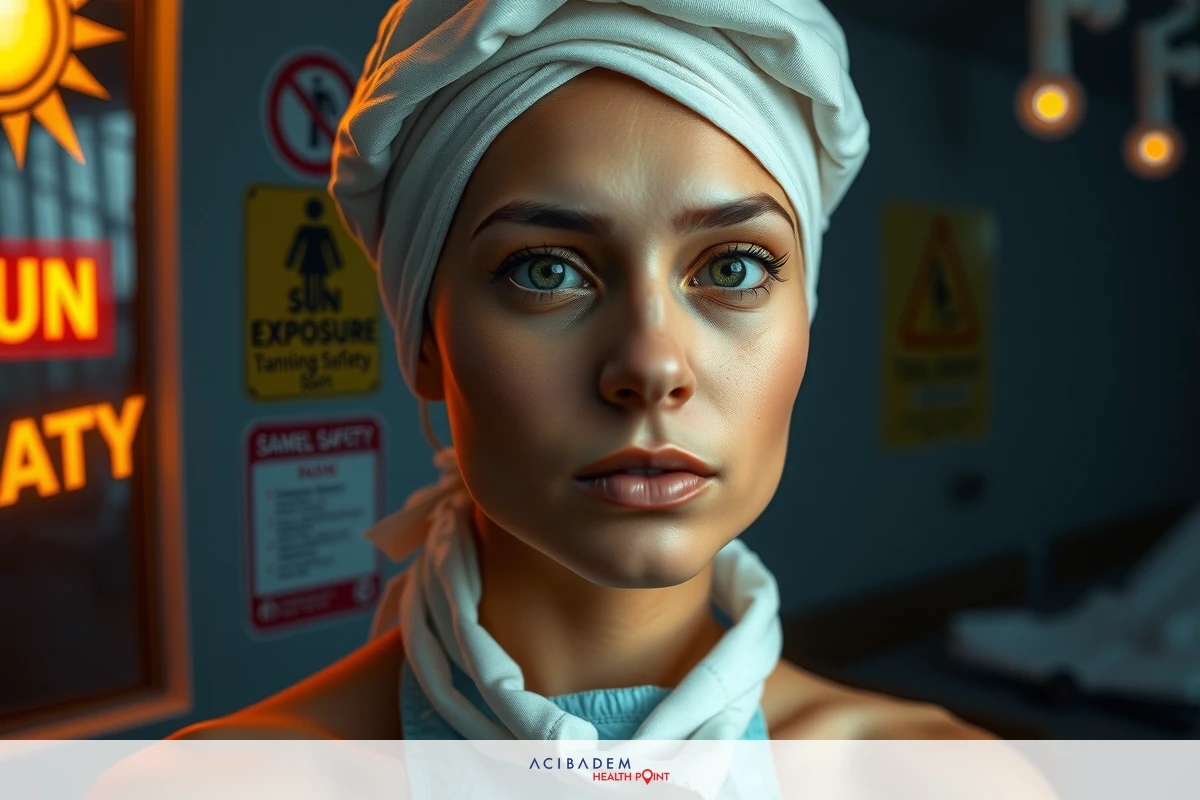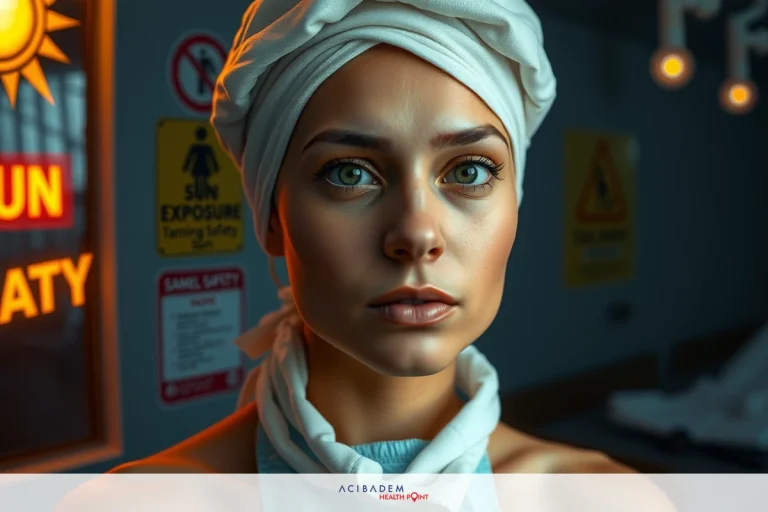Can I Tan After Rhinoplasty?
Can I Tan After Rhinoplasty? Rhinoplasty, often known as a ‘nose job,’ is a widespread form of intervention that alters the nose for either aesthetic or functional purposes. Following this, patients often have questions about their post-operative care and lifestyle changes, including their ability to tan. While sun exposure is generally not encouraged immediately after any type of surgery, there are specific considerations and precautions when it comes to tanning after rhinoplasty.
The healing process after rhinoplasty is crucial to the final result. The appropriate timeline and guidelines for activities such as tanning can help ensure optimal outcomes. This article aims to answer the question – Can you tan after rhinoplasty? – and provide tips for safe sun exposure following your surgery.
Rhinoplasty Recovery
Rhinoplasty recovery is a process that requires patience and adherence to certain guidelines. The initial healing phase typically lasts about two weeks, during which patients may experience swelling, bruising, and some discomfort. During this period, it’s crucial to avoid any strenuous activities that could potentially disrupt the healing process or lead to complications. Post-operative care instructions generally include keeping the head elevated, applying cold compresses to reduce swelling, and taking prescribed medications.
One of the key aspects of rhinoplasty recovery is protecting the nose from any potential injury or irritation, including sun exposure. This is paramount in the first few weeks following surgery as the skin on and around the nose can be particularly sensitive. Sun exposure can exacerbate swelling and prolong recovery time. Patients are advised to stay out of direct sunlight as much as possible during their recovery period. When venturing outdoors, wearing a wide-brimmed hat or using an umbrella for protection is recommended.
It’s also essential to note that while the most important recovery occurs during the first few weeks after rhinoplasty, complete healing takes longer. It can take up to a year for all the swelling to subside and for the final shape of the nose to become apparent. During this time, being mindful of sun exposure remains important as tanning can potentially cause skin changes and affect the outcome of the surgery. Therefore, adhering to post-operative guidelines regarding sun exposure and tanning is crucial for ensuring optimal results from your rhinoplasty procedure.
Tanning After Rhinoplasty
Tanning can be a tempting activity, especially during the warm summer months, but it’s important to consider its implications following rhinoplasty surgery. The skin on and around your nose will be more sensitive after surgery and may react differently to sunlight than it did before. As such, tanning—whether outdoors or in a tanning bed—can potentially increase swelling and discoloration in the nasal area during the post-operative period. It’s generally recommended to avoid direct sun exposure for at least six weeks following rhinoplasty.
Even after the initial recovery period, caution is needed when considering tanning after rhinoplasty. Sun exposure can lead to hyperpigmentation—darkening of the skin—which could affect the aesthetic outcome of your surgery. It’s crucial to remember that while your nose may feel healed on the outside, changes are still taking place underneath the surface of your skin for up to a year after surgery. Therefore, being mindful of sun exposure and tanning even several months post-rhinoplasty is important.
In order to enjoy some sun safely after rhinoplasty, there are certain guidelines you can follow. Using a high SPF sunscreen is essential every time you go outside, regardless of whether it’s sunny or cloudy. Apply it generously on your face, with special attention given to your nose area. Wearing wide-brimmed hats and sunglasses that offer UV protection can also help shield your nose from the sun’s harmful rays. If you’re eager to get a tan, consider using self-tanners or bronzers on your face instead of sunbathing or using tanning beds. These

alternatives can give you a sun-kissed look without putting your recovery at risk. Remember, patience is key in the recovery process after rhinoplasty—it’s better to wait than potentially compromise your results by tanning too soon.
Tips for Safe Tanning
If you’re a sun-lover and have undergone rhinoplasty, it’s crucial to know how to protect your skin while still enjoying the warmth of the sun. While tanning beds and direct sunbathing should be avoided, especially in the early stages of recovery, there are still ways to get a healthy glow without compromising your postoperative healing or the results of your surgery. Here are some tips for safe tanning after rhinoplasty:
- Use Sunscreen: Choose a broad-spectrum sunscreen with an SPF of 30 or higher and apply it generously on your face, especially on the nose area.
- Wear Protective Clothing: A wide-brimmed hat and sunglasses can help shield your face from the sun’s harmful rays.
- Avoid Peak Sun Hours: The sun is strongest between 10 a.m. and 4 p.m., so try to stay indoors or in shaded areas during these hours.
- Consider Self-Tanners: If you’re eager to get a tan, consider using self-tanners or bronzers on your face instead of sunbathing or using tanning beds.
- Stay Hydrated: Drinking plenty of water can help keep your skin healthy and may also aid in your recovery process.
- Follow Your Surgeon’s Guidelines: Always adhere to the specific post-operative instructions provided by your surgeon, as they are tailored to suit your individual healing process.
Remember that while enjoying the sun responsibly is possible after rhinoplasty, taking precautions and following guidelines is key in ensuring optimal recovery and results from your surgery.
Frequently Asked Questions
Can I go tanning immediately after rhinoplasty surgery?
No, it is not recommended to go tanning immediately after rhinoplasty surgery. Sun exposure can increase swelling and prolong the healing process. It's important to wait until you have fully recovered and received clearance from your surgeon before engaging in any tanning activities.
When can I safely start tanning after rhinoplasty surgery?
It is generally advised to wait at least six weeks before exposing your nose to direct sunlight or using tanning beds. This allows sufficient time for the initial healing phase and reduces the risk of complications or unwanted changes to the nasal area.
Are there any alternative methods for achieving a tan after rhinoplasty?
Yes, there are alternative methods for achieving a tan without exposing your nose to the sun. Consider using self-tanners or bronzers on your face to achieve a sun-kissed look. These products can give you a natural-looking tan while protecting your nose during the recovery period.
Will tanning affect the final results of my rhinoplasty?
Tanning can potentially affect the final results of your rhinoplasty by causing hyperpigmentation or skin discoloration in the nasal area. It's important to protect your nose from excessive sun exposure to ensure optimal healing and maintain the desired aesthetic outcome.
What other precautions should I take when tanning after rhinoplasty?
In addition to avoiding direct sun exposure, it is essential to use sunscreen with a high SPF, wear protective clothing such as widebrimmed hats, and stay hydrated. Following these precautions will help protect your skin and support proper healing while still enjoying some time under the sun.











